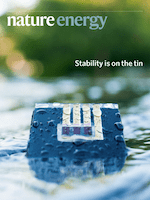
Nature Energy
Scope & Guideline
Leading the charge in energy technology and sustainability research.
Introduction
Aims and Scopes
- Sustainable Energy Technologies:
The journal emphasizes the development and optimization of technologies that harness renewable energy sources, including solar, wind, and hydropower, as well as storage solutions such as batteries and hydrogen production. - Energy Policy and Economics:
Nature Energy explores the economic and policy frameworks necessary for a successful transition to sustainable energy systems, examining impacts on energy access, equity, and community engagement. - Interdisciplinary Approaches:
The journal promotes interdisciplinary research that integrates insights from engineering, economics, social sciences, and environmental studies to address complex energy challenges. - Climate Change Mitigation:
Research published in the journal contributes to understanding how energy systems can be transformed to reduce greenhouse gas emissions and meet climate goals. - Technological Innovations in Energy Storage and Conversion:
The journal highlights advancements in energy storage technologies, including batteries and electrochemical systems, as well as novel methods for energy conversion and utilization.
Trending and Emerging
- Energy Justice and Equity:
Recent publications increasingly focus on the social dimensions of energy, including equity in energy access and the role of marginalized communities in energy transitions. - Decentralized Energy Systems:
There is a growing interest in decentralized energy solutions, such as community solar and microgrids, which empower local communities and enhance energy resilience. - Innovations in Energy Storage:
Advancements in energy storage technologies, particularly in battery chemistry and design, are a prominent theme, reflecting the critical need for efficient storage solutions in renewable energy integration. - Electrification of Transport:
The electrification of transport systems, including electric vehicles and infrastructure development, is increasingly emphasized as a key strategy for reducing emissions and enhancing sustainability. - Integration of AI and Machine Learning in Energy Systems:
The application of artificial intelligence and machine learning to optimize energy systems and improve efficiency is gaining traction, indicating a shift towards data-driven approaches in energy research.
Declining or Waning
- Conventional Energy Sources:
Research related to fossil fuels and traditional energy sources has diminished as the focus shifts towards renewable alternatives and sustainable practices. - Basic Research on Energy Materials:
While foundational studies on energy materials are still relevant, the trend has moved towards applied research that addresses specific technological challenges and commercial applications. - Single-Disciplinary Studies:
There is a notable decline in studies that approach energy issues from a single disciplinary perspective, with a growing preference for interdisciplinary research that incorporates multiple fields.
Similar Journals

Journal of the Japan Institute of Energy
Connecting Ideas to Energy Solutions.Journal of the Japan Institute of Energy, ISSN 0916-8753, is a reputable academic journal dedicated to the field of energy studies, reflecting the dynamic and evolving landscape of energy research. Published by the Japan Institute of Energy, the journal serves as a platform for disseminating innovative research, technologies, and methodologies related to energy engineering, renewable energy sources, and sustainability practices. While this journal does not currently offer open access, it remains a vital resource for professionals, researchers, and students alike, particularly those focused on advancing knowledge within Energy Engineering and Power Technology, Fuel Technology, and related areas. As of 2023, it is ranked in the Q4 quartile across several categories in Scopus, which highlights its foundational role in fostering scholarly discourse, despite its lower ranking in the competitive global landscape. Established in 1990 and continuously evolving, the journal provides insights into the challenges and innovations in the energy sector, making it an essential read for anyone invested in the future of energy solutions.

Energy Storage
Bridging Research and Application in Energy StorageEnergy Storage, published by WILEY, is a pivotal journal dedicated to the rapidly evolving field of energy storage technologies. Since its inception in 2019, the journal has established a significant platform for researchers and professionals by providing insightful articles that explore innovations and advancements in energy engineering and renewable energy systems. With an Impact Factor positioning it in the Q3 category for both Energy Engineering and Power Technology and Renewable Energy, Sustainability, and the Environment, Energy Storage plays a crucial role in disseminating knowledge that addresses global energy challenges. The journal is indexed in Scopus, showcasing its commitment to high-quality research, providing valuable contributions to the community including engaging studies and practical applications aimed at sustainable energy solutions. For those passionate about the future of energy, Energy Storage represents an essential resource for staying informed and connected within this dynamic and interdisciplinary field.

INTERNATIONAL JOURNAL OF GLOBAL ENERGY ISSUES
Transforming Energy Policies Through Scholarly InsightsThe INTERNATIONAL JOURNAL OF GLOBAL ENERGY ISSUES, published by INDERSCIENCE ENTERPRISES LTD, stands as a vital platform for disseminating innovative research in the fields of energy engineering, nuclear energy, and renewable sustainability. With ISSN 0954-7118 and E-ISSN 1741-5128, this journal has been catering to the energy sector since 1989, advancing scholarly dialogue through critical analyses and discussions of emerging energy technologies and policies. Though currently categorized in the fourth quartile across various energy-related disciplines, the journal aims to bridge knowledge gaps and offer insights that challenge the status quo. Operating from its headquarters in the United Kingdom and accessible to a global audience, the journal encourages submissions that drive interdisciplinary research and provide solutions for pressing global energy challenges. Researchers, professionals, and students alike are invited to contribute and engage with this prestigious journal to influence the future of energy practices.

AIMS Energy
Pioneering Research in Renewable Energy and BeyondAIMS Energy is a leading academic journal published by the American Institute of Mathematical Sciences (AIMS), dedicated to advancing the field of energy research. With a strong commitment to Open Access since its inception in 2013, this journal offers a platform for researchers, professionals, and students to share innovative findings and enrich the discourse in crucial areas such as Energy Engineering and Power Technology, Fuel Technology, and Renewable Energy, Sustainability and the Environment. Recognized for its quality, AIMS Energy holds a respectable impact with a Q3 ranking in multiple categories as of 2023, and it ranks within the top half of its peers in the Scopus database. The journal's objective is to disseminate high-quality research that addresses contemporary challenges in energy and offers sustainable solutions. By fostering collaboration and discussion among various stakeholders, AIMS Energy plays a critical role in shaping the future of energy technologies and policies.

Energy Material Advances
Elevating the Future of Energy MaterialsEnergy Material Advances, published by the American Association for the Advancement of Science, stands at the forefront of energy research, showcasing groundbreaking studies in the realm of renewable energy, fuel technology, and materials science. With the journal's commitment to open access since 2020, it aims to democratize knowledge and foster innovation across a global community of researchers, professionals, and students. The journal boasts an impressive impact factor, placing it firmly within the Q1 category across multiple disciplines including Energy (miscellaneous), Fuel Technology, and Renewable Energy, Sustainability and the Environment, highlighting its significance in advancing scholarly discussions. In the latest Scopus rankings, Energy Material Advances ranks among the top 10% of journals in its field, affirming its role as a pivotal resource for current and emerging trends in energy materials. The journal is dedicated to facilitating collaborative efforts and inspiring novel approaches to the challenges posed by energy sustainability and technological advancement.

JOURNAL OF ENERGY ENGINEERING
Championing Integrity in Energy ResearchJOURNAL OF ENERGY ENGINEERING, published by the ASCE-Amer Soc Civil Engineers, serves as a pivotal resource in the fields of civil and structural engineering, energy engineering, and nuclear energy research. With an ISSN of 0733-9402 and an E-ISSN of 1943-7897, this esteemed journal demonstrates a consistent commitment to advancing knowledge in energy systems, sustainability, and waste management. Ranking within the second quartile in several categories—including Civil and Structural Engineering and Energy Engineering and Power Technology—this journal maintains a strong reputation, underscored by its Scopus rankings that place it in the top tiers of its discipline. Accessible from 1982 through 2024, the journal provides researchers and professionals meaningful insights through rigorously peer-reviewed articles, critical reviews, and case studies that address contemporary challenges in energy utilization and infrastructure development. Without open access options, it ensures the integrity and credibility of published work, showcasing influential research that contributes to sustainable solutions in energy and environmental frameworks. Researchers, professionals, and students alike will find the JOURNAL OF ENERGY ENGINEERING an indispensable platform for exploration and dissemination of innovative ideas within the realm of energy and engineering.

Renewable Energy Focus
Championing Research for a Cleaner, Greener PlanetRenewable Energy Focus is a premier journal published by Elsevier, dedicated to advancing the field of renewable energy and sustainability. With an ISSN of 1755-0084 and an E-ISSN of 1878-0229, this journal serves as a vital platform for researchers, professionals, and students interested in innovative solutions to energy challenges. Established in 2007, the journal has evolved to become a recognized authority in the subject area, currently ranked in the Q2 quartile of its category for 2023, emphasizing its significance in promoting impactful research. The journal encompasses a wide range of topics, including solar, wind, bioenergy, and sustainable practices that contribute to environmental conservation and energy efficiency. As part of Elsevier's commitment to disseminating high-quality research, Renewable Energy Focus is indexed in Scopus, currently holding a rank of #92/270 in the energy sector, positioning it in the 66th percentile of its field. This journal offers an essential resource for those dedicated to fostering sustainable energy solutions.

Energy for Sustainable Development
Advancing sustainable solutions for a brighter energy future.Energy for Sustainable Development, published by Elsevier, is a leading interdisciplinary journal dedicated to advancing the academic discourse at the intersection of energy, sustainability, and development. With an impressive Q1 ranking in the fields of Geography, Planning and Development, and Management, Monitoring, Policy and Law, the journal stands out in the academic community for its rigorous peer-reviewed content that addresses crucial energy challenges and promotes innovative solutions. Since its inception, the journal has transitioned through various converged periods, reflecting on dynamic research trends from 1994 onwards. Notably, it boasts meaningful Scopus rankings, including a position in the top 10% of journals for Geography and Planning. Although it currently does not provide open access, the rich pool of research articles published here serves as a vital resource for researchers, professionals, and students committed to fostering sustainable development practices globally. As energy issues become increasingly pivotal in policy formulation and environmental considerations, Energy for Sustainable Development remains a crucial platform for disseminating impactful knowledge and fostering collaboration across disciplines.

EnergyChem
Pioneering Innovations for a Greener Energy Future.EnergyChem is a premier academic journal published by ELSEVIER, dedicated to advancing the field of energy chemistry and its applications in sustainable technologies. With a strong focus on biomaterials and innovative chemistry solutions, the journal has established itself as a leading platform within the research community, boasting remarkable rankings such as Q1 in Biomaterials, Chemistry (miscellaneous), and Energy (miscellaneous) for 2023. Notably, it ranks 2nd in both Materials Science and Energy categories, reflecting the high caliber of research it publishes, which is crucial for tackling pressing global energy challenges. Since its inception in 2019, EnergyChem has been committed to open and accessible research, making it an invaluable resource for researchers, professionals, and students striving for cutting-edge insights in energy conversion and storage. With its target audience in mind, the journal encourages submissions that explore innovative materials, processes, and applications that will contribute to a sustainable energy future.

Journal of Energy in Southern Africa
Connecting Ideas, Shaping Energy Policies in Southern AfricaJournal of Energy in Southern Africa is a distinguished peer-reviewed publication dedicated to the dissemination of research and innovation in the energy sector, particularly within the Southern African context. Published by the University of Cape Town's Energy Research Centre, this open-access journal has been providing a platform for scholarly exchange since 1993, with a renewed commitment to accessible research since 2016. With an ISSN of 1021-447X and an E-ISSN of 2413-3051, it serves as a crucial resource for researchers, professionals, and students interested in advancing their understanding of energy production, sustainability, and policy in the region. The journal is currently ranked in the Q3 category for Computer Science and Energy in the 2023 metrics and has established a solid position in Scopus rankings, highlighting its contribution to the fields of General Computer Science and General Energy. Located in Cape Town, South Africa, the journal not only fosters local research but also encourages a broader international dialogue on energy challenges and solutions. Researchers and practitioners are invited to contribute their findings and case studies, making the journal an essential tool for anyone looking to engage with pressing energy issues.